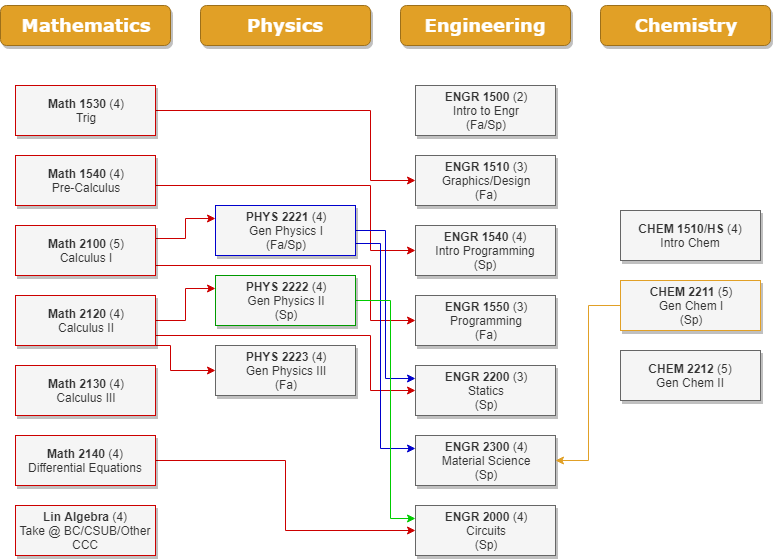Associate in Science in Engineering
Description
The engineering program provides the foundational courses for a student to successfully complete upper division course work to earn a Bachelor of Science degree in multiple engineering disciplines throughout the CSU and UC system as well as many out of state universities and colleges.
Engineers utilize a variety of technical, mathematics, creativity, and problem-solving skills to design, develop, produce, and optimize new products and manufacturing methods. This program starts the development of these skills and qualifies the student to transfer and earn one of the following degree types: B.S. Aerospace, Biomedical, Civil, Chemical, Computer, Electrical, Environmental, Industrial, Manufacturing, Materials, Mechanical, Mechatronic (Robotics) or Engineering Science (Emphasis in Petroleum, Energy and Power, Biosystems and Agricultural, or Management).
Engineering degrees require engineering core curriculum and intensive math, physics, and chemistry courses. This is a “high unit major” and may require additional semesters to complete all required coursework. Preparations in high school including pre-calculus, calculus, physics, chemistry, and Project Lead the Way (PLTW) curriculum will minimize any additional course workload in college. Development of an educational plan with counseling and engineering faculty each semester is strongly encouraged and highly recommended to stay on track towards your degree.
In addition, the Stanley and Madalyn Hutchison Engineering Promise Program (HEPP) at Taft College has been established to provide financial and academic support for students enrolled in the Taft College Engineering Program. For an application and eligibility requirements, please visit the HEPP website.
Students completing this degree have transferred to over 30 different universities and colleges including CSU-Bakersfield, San José State, Cal Poly-SLO, Cal Poly Pomona, UC Berkeley, UC Davis, UC San Diego, Fresno State, CSU Long Beach, and many others.
The Taft College A.S. Engineering degree prepares students to transfer and major in one of the following disciplines:
- Aerospace Engineering
- Biomedical Engineering
- Chemical Engineering
- Civil Engineering Engineering
- Computer Engineering
- Electrical Engineering
- Engineering Science
- Environmental Engineering
- Industrial Engineering
- Manufacturing Engineering
- Mechanical Engineering
See the Associate in Science in Engineering Degree Requirements in the Taft College Catalog below. Please note that this link takes you to an external website.
Taft College - Engineering: Associate in Science
Program and Educational Planning
Engineering degrees require intensive math, science, and engineering course curriculum. They are also considered “high unit majors” and may require additional semesters to complete all required coursework. Preparations in high school including pre-calculus, physics, chemistry, and Project Lead the Way (PLTW) curriculum will minimize any additional course workload. Developing an educational plan with Taft College Counseling and Engineering faculty, and meeting with a counselor each semester, are strongly encouraged and highly recommended.
Transfer school options
Engineering and Physics Class Offerings and Prerequisites
| CLASS | PREREQUISITE | FALL | SPRING |
| ENGR 1500 | NONE | X | X |
| ENGR 1510 | MATH 1530 | X | |
| ENGR 1540 | MATH 1540 | X | |
| ENGR 1550 | MATH 2100 | X | |
| ENGR 2000 | MATH 2140 (pre/co-req) | X | |
| ENGR 2200 | MATH 2120 and PHYS 2221 | X | |
| ENGR 2300 | CHEM 2211 and PHYS 2221 | X | |
| PHYS 2221 | MATH 2100 (pre/co-req) | X | X |
| PHYS 2222 | PHYS 2221 and MATH 2120 (pre/co-req) | X | |
| PHYS 2223 | PHYS 2222 and MATH 2120 | X |
Program Learning Outcomes
The program is designed to create the following outcomes:
- Student demonstration of critical thinking, creativity, and problem-solving skills as individuals and as teams.
- Demonstrate proper application of foundational engineering, mathematics, and science skills while solving current industry problems.
- Make effective career choices in the engineering field.
Engineering Course Flowchart

Earnings Potential
For those who transfer and successfully complete their B.S. degree in an engineering discipline, these are examples of your earnings potential. The median annual wage is $122,270 for aerospace engineer; $88,050 for civil engineer; and $128,170 for computer engineer.1
1 “Occupational Outlook Handbook.” 8 Sept. 2022.